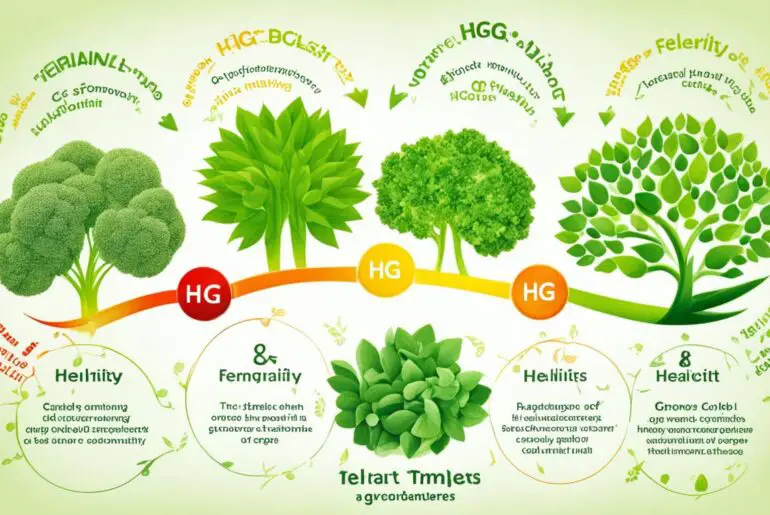Are you tired of trying different diets and struggling to lose weight? The HCG diet claims to offer fast weight loss without hunger, but is it too good to be true? In this article, we will explore the benefits of the HCG diet specifically for women, and separate fact from fiction.
When it comes to weight loss, women often face unique challenges. The HCG diet promises to address these challenges by combining an ultra-low-calorie diet with HCG hormone injections. But what exactly are the benefits of the HCG diet for women? Does it truly deliver on its promises?
Join me as we delve into the world of the HCG diet and evaluate its effectiveness for women. We will analyze the role of HCG in the body, the weight loss mechanisms of the diet, its impact on body composition, and much more. By the end, you’ll have a comprehensive understanding of whether the HCG diet is the right choice for you.
Key Takeaways:
- The HCG diet promises fast weight loss without hunger.
- Studies have shown that weight loss on the HCG diet is primarily due to drastic calorie restriction.
- Severe calorie restriction can lead to muscle loss and a slowdown in metabolism.
- There are safer and more sustainable methods for achieving weight loss.
- Consulting with a healthcare professional is recommended before considering the HCG diet.
The Role of hCG in the Body
During early pregnancy, the body produces a hormone called human chorionic gonadotropin (hCG). This hormone plays a crucial role in maintaining the pregnancy and supporting the development of the fetus. One of its main functions is to stimulate the production of progesterone, a hormone necessary for the growth of the uterine lining and the maintenance of a healthy pregnancy.
After the first three months of pregnancy, the levels of hCG in the blood start to decrease as the placenta takes over the production of progesterone. However, hCG can still be detected in the urine, which is why home pregnancy tests rely on detecting hCG levels to confirm pregnancy.
Aside from its role in pregnancy, hCG also has other functions in the body. It can stimulate the production of other hormones, such as testosterone, which is important for men’s health. In addition, hCG has been used in fertility treatments to help stimulate ovulation in women.
Overall, the presence of hCG in the body during early pregnancy is vital for maintaining the pregnancy and supporting the development of the fetus. Its functions extend beyond pregnancy, playing a role in hormonal balance and fertility. Understanding the role of hCG can provide valuable insights into its uses and potential benefits in various aspects of women’s health.
| Key Functions of hCG in the Body |
|---|
| Stimulates the production of progesterone to maintain a healthy pregnancy |
| Supports the development of the uterine lining |
| Plays a role in stimulating ovulation in fertility treatments |
| Can stimulate the production of testosterone in men |
| Contributes to overall hormonal balance |
Weight Loss on the HCG Diet

When it comes to the HCG diet, proponents claim that it can boost metabolism and lead to significant weight loss, all while keeping hunger at bay. However, scientific studies have provided a different perspective on the weight loss mechanisms of the HCG diet. It has been concluded that the main reason for weight loss on this diet is not the HCG hormone itself, but rather the drastic ultralow calorie intake.
In various studies comparing individuals on the HCG diet with those on a calorie-restricted diet without HCG hormone injections, similar weight loss results were observed. This suggests that the HCG hormone does not play a significant role in the weight loss experienced on the diet.
“Weight loss on the HCG diet is primarily due to the ultra-low-calorie intake and not the HCG hormone itself.”
Furthermore, the HCG hormone has not shown substantial appetite-suppressing effects. Therefore, hunger is not significantly reduced by the HCG hormone in the context of the diet. It is the severe calorie restriction that may lead to hunger suppression.
| Weight Loss Mechanisms of the HCG Diet |
|---|
| Drastic calorie restriction |
| Ultralow calorie intake |
The table above summarizes the weight loss mechanisms of the HCG diet. As seen, the primary driving force behind weight loss is the severe calorie restriction, rather than the HCG hormone itself. Although the diet may lead to significant weight loss, it is essential to consider the potential risks and side effects associated with such extreme calorie restriction.
The Impact on Body Composition
Severe calorie-restricted diets, such as the HCG diet, can have a significant impact on body composition, leading to decreased muscle mass and a slowdown in metabolism. When the body is deprived of adequate calories, it begins to break down muscle tissue for energy, resulting in muscle loss. This can have negative effects on overall body composition and may lead to a less toned and defined look.
Proponents of the HCG diet claim that it can prevent muscle loss and promote an anabolic state, where the body can build and maintain muscle mass even while in a calorie deficit. However, there is no scientific evidence to support these claims. The HCG hormone itself does not have any direct impact on muscle preservation.
It’s important to note that low-calorie diets, like the HCG diet, are not effective for long-term weight loss. While they may lead to rapid initial weight loss, a significant portion of the weight loss comes from water and muscle loss rather than fat. This can result in a slower metabolism and make it more difficult to maintain weight loss in the long run.
Instead of relying on the HCG diet, it is recommended to focus on sustainable and balanced approaches to weight loss and body composition. This includes consuming a well-rounded diet that meets the body’s nutritional needs, engaging in regular physical activity to maintain and build muscle mass, and making lifestyle changes that support long-term success.
For those looking to prevent muscle loss during weight loss, it is important to prioritize resistance training exercises that specifically target the muscles. This can help stimulate muscle growth and maintenance even in a calorie deficit.
The Importance of Resistance Training
Resistance training, also known as strength training or weightlifting, is a crucial component of any weight loss or body composition program. It involves using external resistance, such as weights or resistance bands, to challenge the muscles and stimulate their growth.
When combined with a balanced diet, resistance training can help prevent muscle loss during weight loss. It helps maintain muscle mass, improve overall strength and endurance, and promote a toned and defined physique.
Additionally, resistance training has been shown to have numerous health benefits, including improved bone density, increased metabolism, and enhanced functional capabilities. It can also help prevent age-related muscle loss, known as sarcopenia, which is common as we get older.
It’s recommended to incorporate resistance training into your fitness routine at least two to three times a week. This can be done through a variety of exercises, including weightlifting, bodyweight exercises, or using resistance bands. It’s important to start at an appropriate level of intensity and gradually increase as your strength and fitness levels improve.
The Role of Nutrition in Body Composition
In addition to resistance training, nutrition plays a critical role in supporting optimal body composition. Consuming a well-balanced diet that provides adequate protein, healthy fats, and carbohydrates can help preserve muscle mass and promote fat loss.
Protein, in particular, is essential for muscle growth and repair. It provides the building blocks needed to support muscle tissue and can help prevent muscle loss during periods of weight loss. Incorporating lean sources of protein, such as lean meats, poultry, fish, beans, and tofu, into your meals and snacks can help support muscle maintenance and overall body composition goals.
At the same time, it’s important to avoid excessively restrictive diets that severely limit calorie intake. These types of diets can lead to muscle loss and a slower metabolism, making it more difficult to achieve sustainable weight loss and maintain a healthy body composition.
Instead, focus on creating a calorie deficit through moderate and sustainable means. This can be achieved by reducing portion sizes, making healthier food choices, and incorporating regular exercise into your routine. Consulting with a registered dietitian or nutritionist can also provide guidance and personalized recommendations for achieving your body composition goals.
The Rules of the HCG Diet
The HCG diet follows a structured set of rules to achieve weight loss. This diet consists of three phases: loading, weight loss, and maintenance.
The Loading Phase:
In the loading phase, individuals are encouraged to consume high-calorie foods for around two days. This phase helps prepare the body for the upcoming calorie restriction during the weight loss phase.
“The loading phase allows the body to store extra calories, which will be used as energy during the subsequent weight loss phase.”
The Weight Loss Phase:
The weight loss phase is the most crucial part of the HCG diet. It typically lasts for a minimum of three weeks and involves a highly restricted calorie intake.
- HCG hormone injections or oral drops are taken daily.
- Individuals consume two meals per day.
- Fats, oils, sugars, and certain food groups are restricted.
- Calorie intake is limited to approximately 500 calories per day.
The Maintenance Phase:
After completing the weight loss phase, the maintenance phase begins. During this phase, individuals gradually increase their calorie intake and introduce a wider variety of foods back into their diet while avoiding starch and sugar.
It’s essential to follow these rules diligently to achieve the desired results on the HCG diet.
| Phase | Description |
|---|---|
| Loading Phase | Consuming high-calorie foods to build energy stores |
| Weight Loss Phase | Strict calorie restriction, two meals per day, limited food choices |
| Maintenance Phase | Gradual increase in calorie intake, reintroduction of foods, avoidance of starch and sugar |
Scam Products in the Market

When it comes to the HCG diet market, it’s important to be wary of scam products that are prevalent online. One common type of scam product is homeopathic HCG. These products claim to contain HCG hormone but do not actually have any real HCG in them.
Only injections can raise blood levels of HCG hormone, while homeopathic products are ineffective and potentially unsafe.
Homeopathic HCG products often come in the form of drops or pellets, claiming to promote weight loss just like the real HCG hormone. However, scientific research has consistently shown that weight loss on the HCG diet is primarily due to the extremely low-calorie intake, not the presence of the hormone itself.
It’s important to remember that the HCG diet is not approved by the FDA, and using homeopathic HCG products can be misleading and potentially harmful.
Always be cautious when purchasing HCG products online and consult with a healthcare professional before starting any weight loss program.
| Product Type | Claims | Effectiveness | Safety |
|---|---|---|---|
| Homeopathic HCG | Claims to contain HCG hormone for weight loss | Ineffective | Potentially unsafe |
| HCG Injections | Contains real HCG hormone for weight loss | May aid weight loss | Requires medical supervision |
Safety and Side Effects
The safety of the HCG diet and its potential side effects are important considerations before embarking on this weight loss regimen. It is essential to be aware of the risks associated with this diet and consult with a healthcare professional for personalized advice.
The U.S. Food and Drug Administration (FDA) has not approved HCG as a weight loss aid. They warn against using over-the-counter HCG products, as these may not meet safety standards or contain accurate amounts of the hormone. It is crucial to understand that the use of HCG for weight loss is considered illegal and potentially dangerous by the FDA.
While on the HCG diet, some individuals may experience side effects. These can include headaches, fatigue, and depression. It is also important to note that severe calorie restriction, a key component of the HCG diet, can have serious consequences. Drastic calorie reduction can lead to nutrient deficiencies, muscle loss, and a slowdown in metabolism.
There have also been reports of more severe complications associated with the HCG diet, such as blood clots. It is essential to be aware of the potential risks before considering this weight loss method.
| Side Effects | Safety Concerns |
|---|---|
| Headaches | Inaccurate HCG dosage in over-the-counter products |
| Fatigue | Potential for nutrient deficiencies |
| Depression | Risk of muscle loss |
| Blood clots | Slowdown in metabolism |
Given the potential risks and side effects associated with the HCG diet, it is crucial to make informed decisions about weight loss strategies. Consulting with a healthcare professional can provide valuable guidance on safer and more effective methods for achieving sustainable weight loss and overall health improvements.
The Bottom Line

After analyzing numerous studies, it is clear that the HCG diet primarily relies on drastic calorie restriction for weight loss rather than the HCG hormone itself. Although the diet may promise fast results, it is crucial to consider the potential risks and side effects associated with extreme calorie limitations.
If you are seeking safer methods for weight loss, I strongly recommend consulting with a healthcare professional to develop a personalized plan that aligns with your health goals and needs. They can provide valuable guidance on adopting healthier eating habits, incorporating regular exercise, and making sustainable lifestyle changes.
“Weight loss is not just about shedding pounds; it’s about improving overall health and well-being.”
Instead of resorting to extreme diets like the HCG diet, focusing on long-term, sustainable changes to your eating and lifestyle habits is key. By adopting a balanced and nutritious diet and engaging in regular physical activity, you can promote weight loss, enhance your overall health, and reduce the likelihood of weight gain in the future.
Remember, your health is precious, and it is always best to prioritize safe and effective weight loss methods. Your healthcare professional can guide you towards evidence-based strategies that address your individual needs and promote lasting results.
Note:
The information provided here is intended for informational purposes only and should not be considered as medical advice. Always consult with a qualified healthcare professional before making any changes to your diet or exercise routine.
| Safer Weight Loss Methods | |
|---|---|
| Incorporate a balanced and nutritious diet | Engage in regular physical activity |
| Set realistic weight loss goals | Maintain a consistent sleep schedule |
| Stay hydrated and limit sugary beverages | Seek support from a healthcare professional or registered dietitian |
| Monitor portion sizes | Practice stress management techniques |
The Role of HCG Therapy for Women’s Health

HCG therapy can play a crucial role in supporting women’s health and achieving wellness goals. Through its hormone-balancing properties, HCG therapy has been demonstrated to elevate hormone levels, including testosterone, which can have various beneficial effects on the body.
One of the key advantages of HCG therapy is its ability to prevent muscle loss during weight loss journeys. Unlike many other weight loss methods that lead to a catabolic state, HCG therapy creates an anabolic state, helping individuals maintain their muscle mass while shedding unwanted fat.
But the benefits of HCG therapy go beyond weight management. It has the potential to contribute to overall hormonal balance in women. Hormones play a vital role in numerous bodily functions and processes, such as mood regulation, bone health, and energy levels. By optimizing hormone levels, HCG therapy can promote overall well-being and enhance women’s health.
Additionally, HCG therapy has been explored for its potential benefits in promoting fertility. This therapy has shown promise in supporting reproductive health by regulating hormone levels and optimizing ovulation. For women struggling with fertility issues, HCG therapy may offer a valuable adjunct to their treatment plans.
While HCG therapy presents potential benefits for women’s health, it is important to discuss its use with a qualified healthcare professional. They can evaluate individual needs and develop personalized treatment plans based on specific health considerations.
The Benefits of HCG Therapy for Women’s Health:
- Preserves muscle mass during weight loss
- Promotes hormonal balance
- Aids in weight management
- Assists in fertility treatment
In summary, HCG therapy offers a unique approach to women’s health by supporting hormone regulation, weight management, and fertility. By working closely with healthcare professionals, women can explore the potential benefits of HCG therapy and make informed decisions about their well-being.
| Benefit | Explanation |
|---|---|
| Preserves Muscle Mass during Weight Loss | HCG therapy helps prevent muscle loss, enabling individuals to maintain their strength and shape while losing excess fat. |
| Promotes Hormonal Balance | By optimizing hormone levels, HCG therapy contributes to overall hormonal balance, positively impacting mood, energy, and various bodily functions. |
| Aids in Weight Management | HCG therapy supports weight management efforts by optimizing metabolism and preventing further weight gain. |
| Assists in Fertility Treatment | HCG therapy may offer benefits for women seeking to enhance their fertility by regulating hormone levels and optimizing ovulation. |
Addressing Underlying Causes and Lifestyle Modifications

To achieve sustainable weight loss and overall health improvements, it is important to address the underlying causes of weight gain and make lifestyle modifications. By identifying and addressing these underlying causes, individuals can take a comprehensive approach to weight management that goes beyond fad diets or quick fixes.
One crucial step in addressing underlying causes is working with a healthcare professional to develop a personalized plan tailored to individual needs and goals. This plan may include a balanced diet that provides essential nutrients while controlling calorie intake. It may also emphasize regular physical activity to promote weight loss and improve overall fitness.
Additionally, lifestyle modifications can play a significant role in weight management. This may involve identifying and managing stress, incorporating stress reduction techniques such as mindfulness or meditation, and getting enough quality sleep. It is important to recognize that factors like emotional eating, sedentary behavior, and poor sleep patterns can contribute to weight gain and make long-term weight management difficult.
In some cases, addressing underlying causes may require seeking additional support from professionals such as nutritionists, dietitians, or therapists. These experts can provide guidance and strategies to help individuals develop healthier habits and overcome obstacles on their weight loss journey.
Below is a table highlighting some common underlying causes of weight gain and lifestyle modifications that can help address them:
| Underlying Causes | Lifestyle Modifications |
|---|---|
| Unhealthy dietary habits | – Adopting a balanced and nutritious diet – Controlling portion sizes – Incorporating more fruits, vegetables, and whole grains – Limiting processed and sugary foods |
| Sedentary lifestyle | – Engaging in regular physical activity and exercise – Incorporating cardio and strength training – Finding activities that are enjoyable and sustainable – Setting achievable fitness goals |
| Emotional eating | – Identifying emotional triggers for overeating – Finding alternative ways to cope with emotions – Seeking support from therapists or support groups – Practicing mindful eating techniques |
| Poor sleep patterns | – Establishing a consistent sleep schedule – Creating a relaxing sleep environment – Limiting caffeine and electronic device usage before bedtime – Seeking treatment for sleep disorders if necessary |
By addressing underlying causes and making lifestyle modifications, individuals can take a proactive approach to weight management that focuses on long-term success and overall well-being. It is important to remember that sustainable weight loss and healthy habits take time and commitment, but the rewards are well worth it.
Conclusion
In conclusion, the HCG diet may promise fast weight loss, but it is important to understand that the primary factor contributing to this weight loss is the drastic calorie restriction, rather than the HCG hormone itself. Numerous studies have shown that individuals on the HCG diet and those on a calorie-restricted diet without HCG hormone injections experience similar weight loss.
It is crucial to note that the HCG diet is associated with potential risks and side effects, and the FDA has not approved HCG as a weight loss aid. Some of the side effects include headaches, fatigue, and even serious complications like blood clots. Therefore, it is recommended to explore safer methods for achieving weight loss and maintaining overall health.
If you are considering the HCG diet, it is highly advisable to consult with a healthcare professional who can provide personalized advice based on your specific needs and goals. They can help you develop a well-rounded weight loss approach that includes a balanced diet, regular exercise, and other lifestyle modifications. Remember, sustainable weight loss and overall health improvements require addressing the underlying causes of weight gain and making lasting changes.
FAQ
What are the benefits of the HCG diet for women?
The HCG diet is often touted for its ability to promote fast weight loss without hunger. However, it is important to note that the FDA deems the HCG diet illegal and dangerous. The weight loss experienced on this diet is primarily due to severe calorie restriction, not the HCG hormone itself.
What is the role of hCG in the body?
hCG is a hormone that is produced during early pregnancy and helps maintain the production of important hormones like progesterone. After the first 3 months of pregnancy, blood levels of hCG decrease.
How does the HCG diet contribute to weight loss?
The HCG diet involves drastic calorie restriction, typically around 500 calories per day, which leads to weight loss. Studies have shown that weight loss on the HCG diet is primarily due to the low-calorie intake, not the HCG hormone itself.
Does the HCG diet prevent muscle loss?
There is no scientific evidence to support the claim that the HCG diet prevents muscle loss. Severe calorie-restricted diets, like the HCG diet, can actually lead to decreased muscle mass and a slowdown in metabolism.
What are the rules of the HCG diet?
The HCG diet typically consists of three phases: loading phase, weight loss phase, and maintenance phase. During the weight loss phase, individuals are only allowed to eat two meals per day with specific food portions and restrictions on fats, oils, and sugars.
Are there scam products in the HCG diet market?
Yes, many HCG products available online are labeled as homeopathic and do not contain any real HCG hormone. Homeopathic products are ineffective and potentially unsafe. Only injections can raise blood levels of the HCG hormone.
Is the HCG diet safe? What are the side effects?
The HCG diet is associated with potential risks and side effects. These can include headaches, fatigue, depression, and even serious complications like blood clots. It is important to consult with a healthcare professional before considering the HCG diet.
What is the bottom line on the HCG diet?
The HCG diet is an extreme weight loss diet that is not approved by the FDA. Studies have shown that weight loss on the HCG diet is primarily due to severe calorie restriction, not the HCG hormone itself. There are safer methods for achieving weight loss and maintaining overall health.
What is the role of HCG therapy for women’s health?
HCG therapy has been shown to raise hormone levels, including testosterone, which can help prevent muscle loss during weight loss. It may have potential benefits for women’s health, including weight management, hormonal balance, and fertility.
How can underlying causes be addressed for weight loss?
To achieve sustainable weight loss and overall health improvements, it is important to address the underlying causes of weight gain and make lifestyle modifications. This may include working with a healthcare professional to develop a personalized plan that includes a balanced diet, regular exercise, and other lifestyle changes.
What is the conclusion on the benefits of the HCG diet for women?
The HCG diet promises fast weight loss, but studies have shown that weight loss is primarily due to drastic calorie restriction, not the HCG hormone itself. The HCG diet is associated with potential risks and side effects. It is recommended to consult with a healthcare professional for personalized advice.




